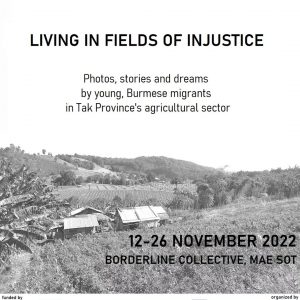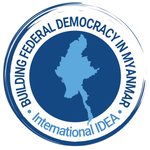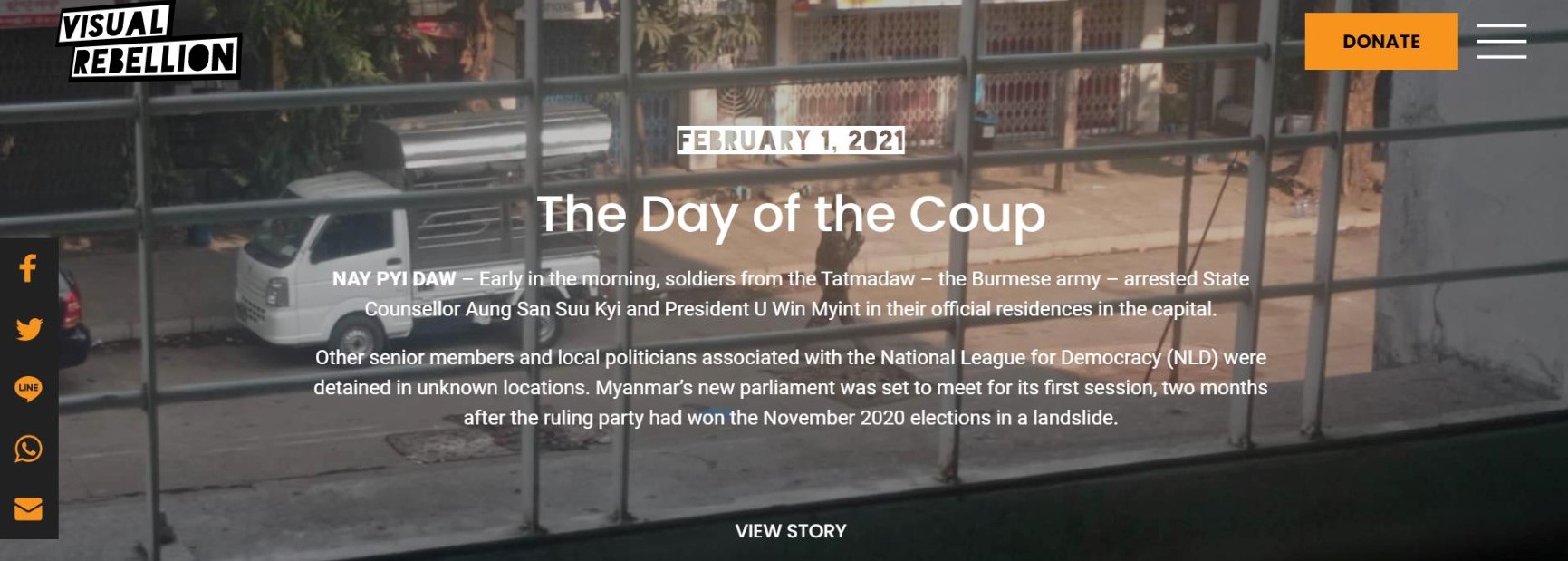Visual Rebellion
Visual Rebellion
Visual Rebellion is a collective platform for Burmese journalists, photographers, filmmakers and artists to fund and publish their work in the aftermath of the 1 February 2021 coup.
The creative and media communities are particularly persecuted and have been forced underground. Three reporters have been killed by the junta, more than 120 have been arrested and Myanmar has been downgraded to rank 176 out of 180 countries in terms of press freedom. As a war on information is raging in the country, Visual Rebellion aims to provide Burmese creators with the necessary resources to keep producing and spreading high-value verified content on what is happening in Myanmar.
Their timeline of how events unfold on the ground since the military seized power is updated twice a month with original reporting and photography from a team based in Myanmar and in Thailand’s border area.
Interview with the Minister Naw Susanna Hla Hla Soe
Naw Susanna Hla Hla Soe was appointed Ministry of Women, Youths and Children Affairs (MoWYCA) of the National Unity Government (NUG) on April 16th, 2021. She entered politics after more than a decade of activism on the frontlines. She belongs to the Karen ethnic group and became active in the empowerment Karen Women's Action Group in 2003, focusing on freedom, equality and gender rights. From 2013 to 2019, she chaired the Women Organisation's Network, active in all of Myanmar.
In parallel, she served from 2015 to 2020 as a Member of Parliament at the Amyotha Hluttaw (House of Nationalities), having won the 10th constituency of Yangon Region as an NLD candidate. Following her re-election in 2020, she was nominated as Karen Ethnic Affairs Minister for Yangon Region but was not allowed to fulfill this mandate due to the February 1st, 2021 military coup led by General Min Aung Hlaing.
To avoid arrest or worse as the SAC is targeting all politicians and activists since its seizure of power, she moved back to Karen state with thousands of other activists and politicians. She now has to live and work underground and in exile. She speaks with Visual Rebellion Myanmar about the suffering faced by women and children, the NUG actions to help and strengthen affected communities, as well as the need for the world's attention to her country's crisis.
- What are the main issues faced by women in Myanmar? How did those challenges evolve since the coup?
It has always been hard for women in Myanmar because it’s a patriarchal society, historically under military rule and culturally conservative. After the most recent coup, the situation became even worse because military power has greatly increased and the military use rape as a weapon to oppress the opposition groups. Whenever they burn the houses, they attack the communities, they find women who become victims of rape.
The military use a lot of different patterns of rape, such as raping women in front of their husbands or their fathers. They did it before in the ethnic states, now they do it even in the cities. When they arrest people, especially women, and take them to police stations, they humiliate them in public, and often touch and rape them.
· How can civil society groups operate at the moment and reach people in need?
It is very difficult because the junta arrested CSO (Civil Society Organisations) leaders, and most of them and women activists had to move to border areas. Some of them had to establish their offices in Thailand. The NUG is working with CSOs through an understanding with local authorities to distribute aid material inside Myanmar.
- What are the current actions the NUG is able to take on the ground?
We have many programs focused on health, education, youth activities, as well as Internally Displaced Persons (IDP), pregnant women, and mother and child development support. We have 580 Civil Disobedience Movement (CDM) staff who don’t want to work for the junta and who are working for our Ministry on the ground. We also formed a Women's Network with representatives from all of Myanmar states and regions working together to implement those programs quickly and effectively. Some of them are IDP camp leaders and one of the main missions of the network is to help IDPs. They send us information about their needs, difficult child deliveries or injuries, military raids or burned houses and then we can send money or appropriate support. Thanks to technology, they can reach us safely through the Signal application. This network's regular meetings are also attended by women MPs who still work in their constituencies and existing political parties in the ethnic states, such as the Karen Women Organisation in Kayin state or the Karenni Women Organisation in Kayah state.
· How is the MoWYCA coordinating with other ministries to tackle cross-cutting issues such as the situation of marginalized groups or refugees?
We have a weekly inter-ministerial meeting where every NUG Ministry attends and shares the information they have gathered. Of course, we work a lot on crosscutting issues with the NUG Ministry of Human rights as well as the NUG Ministry of Health and the NUG Ministry of Education, as the human rights aspects, health issues and the specific needs of women, youth and children have to be addressed holistically.
- Do you have a specific program for women serving in the People Defense Forces (PDF)?
We estimate that 5 to 10 % of PDF are women but we never give our true figures because our enemy will then know our strength. The exact number of fighters is a sensitive information part of military operations. For women fighting on the frontline, we give sexual health education, we provide menstruation pads as well as experience-sharing and counseling sessions.
We also have a counseling online service called Taing Pin Phaw (https://www.facebook.com/taingpinphaw/) which is led by medical doctors, so people can use this service if they want help with their mental health issues. Whoever can call and get a consultation.
- How about financial resources of the MoWYCA? What are the needs? Do they get any support from international agencies or only donations from people?
Our budget is made up of both donations from international partners and from our people. But our needs are very high, our country is in crisis, so it’s not enough and we need much more to be able to operate effectively.
As of late September 2022, the military burnt close to 40 000 houses in the country so we need funding for rehabilitation, protection of women and we also struggle to deal with maintaining support to defectors who need food and shelter.
The wives of defectors have already formed their own network, Pyithu Sitar Zani Myar (Wives of People's Soldiers https://www.facebook.com/wifeofpeoplessoldier) so we meet with them, financially support them and organize vocational training such as cooking, sewing, handicrafts so they can make a living out of the army bases. We are also helping the defectors through those networks as most of them come with their families. In the ethnic areas, the EAOs are taking care of the defectors by supporting and schooling, so the children of defectors are either welcomed in ethnic groups or in NUG-run schools.
- Do you have any comment on the airstrike by the junta on a school in Depayin, Sagaing mid-September 2022? Did your Ministry manage to gather data on those crimes and what do you hope to do with it? How can the world help to stop those war crimes on children?
It happened on September 16th and it is a really dark day for our country because more than ten children were killed and twenty more are injured. Teachers were arrested and brought to the military camp. The army said they would send them to the hospital but it’s very doubtful that they did, as we know that they killed one of the teachers on the way. It shows the extreme brutality of the military.
As soon as we heard this news, we sent information to the United Nations (UN) so they can talk about this issue during the UN General Assembly. We also sent help to evacuate the villagers who witnessed the airstrike and sent money to the families of injured children.
We are still very worried for the people, children and adults, who were arrested by the military in the aftermath of the airstrike. International organizations such as UNICEF and Save the Children, World Vision should raise their voices to help release them.
- How would you describe female political participation in Myanmar, from representation of elected politicians to the civic involvement of women?
I believe that in this revolution time, there are many sad stories but we also have a lot of hopeful stories. One of them is that people now accept leadership by women. So many women are active in the strike, the Women Network is involved in helping IDPs everywhere...
It’s also the first time in the history of Myanmar that there is a Minister for Women and Youth. In the NUG Cabinet, there are seven women Ministers and in our Ministry, we have 65% of female staff. It’s a changing of mindset for the whole country. I think this momentum when the gender norms have been broken should be kept all along the journey until victory. I think we should take this opportunity to bring more female leadership and acknowledge their participation in history.
- How did the revolution change the collective mindset into being favorable to women in positions of leadership?
The revolution started with two young women, Esther Ze Naw Bamvo - who is Kachin - and Ei Thinzar Maung - who is Shan-ni and who is my deputy Minister now, as they led people on the first anti-military protest in Yangon five days after the coup.
So people know that these young women are brave and capable and to this day, women are on the frontline in the PDFs as well as in the CDM. One of the prominent strike groups is the Women Alliance Burma which leads a lot of campaigns. We have to give them the credit for change because they are change-makers.
- How to ensure a greater political representation of women in the next government?
We need concrete policies in our Constitution and the Federal Democracy Charter, the body in charge of the drafting committed to a 30% quota of women participation in politics. Our Ministry and the NUG as a whole also have gender-knowledge and guarantee that they will conduct follow-up and not just pay lip service.
So we have to bring this new momentum into the new country. We also need international pressure. Some international organizations have the rule that when they give funding, gender-balance has to be respected, so there should be this kind of discipline in the future.
- How is the MoWYCA Ministry supporting those steps to guarantee these rights in the Constitution currently crafted by pro-democracy actors?
Our Ministry is part of the Committee of Transitional Constitution and we also work with the
National Unity Consultative Council (NUCC). We have regular meetings with a joint committee about gender policy. There we make sure that solid gender equality provisions are present in the Constitution project.
- In the current situation, what is the way forward for more women from diverse backgrounds to be able to enter the political scene?
We currently have a series of trainings for young women as well as women's rights training and gender-issues training with CSOs. We are developing policy papers and guidelines that we can use for decision-making on all most important issues, such as the case of Women IDPs during the conflict.
- What are the main activities of the youth department in your Ministry?
The Youth Affairs department is active in many fundraising campaigns, as well as the organization of strikes and vocational training. The director is only 25 years old.
- What is your personal goal?
I am very happy and proud to serve my people in this special situation because they have been under military rule for more than seventy years so they deserve freedom, democracy and development. People are now struggling with basic needs like food and medicine and even have to run to save their lives.
I would like the international community to not close its eyes, to not shut its mouth. The military is perpetrating genocide against our people, killing children, raping women, attacking schools and hospitals. We need to take action against this barbarous military so please accept and recognize us as a government.
- How would recognition by other states and the UN help you on the ground?
If the UN recognizes us as the legitimate government of Myanmar, we could easily receive international support and funding, we could transform the military into a professional army, we could be a peaceful and honorable country in ASEAN as well as in the UN.
Now the world is changing a lot, there are other crises in Ukraine and Afghanistan. In Burma, we have been suffering for seventy years so please do not forget us because we are still fighting and we will never give up. Until the end, we will fight so please stay with us and support us.
If we were given the means, we could fully control the situation. More than 50% of the country is now controlled by the NUG and EAO allies (https://specialadvisorycouncil.org/wp-content/uploads/2022/09/SAC-M-Briefing-Paper-Effective-Control-in-Myanmar-ENGLISH-1.pdf) so if we get more support from the international community, we can control the whole country and we can build a federal democracy which doesn't discriminate against any religion, race or belief and give prosperity to the people.
Now the military can only control the big cities and fight with jet warplanes in the countryside. So first other countries should stop selling fuel to the junta. This is why NUG should be the legitimate government so they can control this sort of thing and save our people.
One river, one border, two realities
The endless escape of Myanmar people out of their land is worsening since the military coup of 2021. As realpolitik and national security issues topple humanitarian concerns, tragedies along the river marking the border between Thailand and Myanmar keep unfolding.
Myanmar has a long history of residents fleeing to neighbouring countries due to the dangerous environment they find themselves in. This traces back to the military coup of 1962 by General Ne Win. He implemented a policy called the “Burmese way to Socialism”, which refers to an attempt by the authoritarian leader to establish a socialist society through broad-scale nationalisation of industry and collectivisation of agriculture. However, the policy is widely viewed as a failure because it was anti-democratic and it coincided with a period of sharp economic decline in Myanmar. This policy, in addition to existing civil conflicts, led to millions of people who fled to different countries, especially to Thailand, where half of the diaspora lives. Since the mid-1980s, there have been nine refugee camps established at the border with Thailand holding about 90,000 people from Myanmar. Stuck in a limbo, they cannot go outside to work or study and most have nothing to go back to in Myanmar.
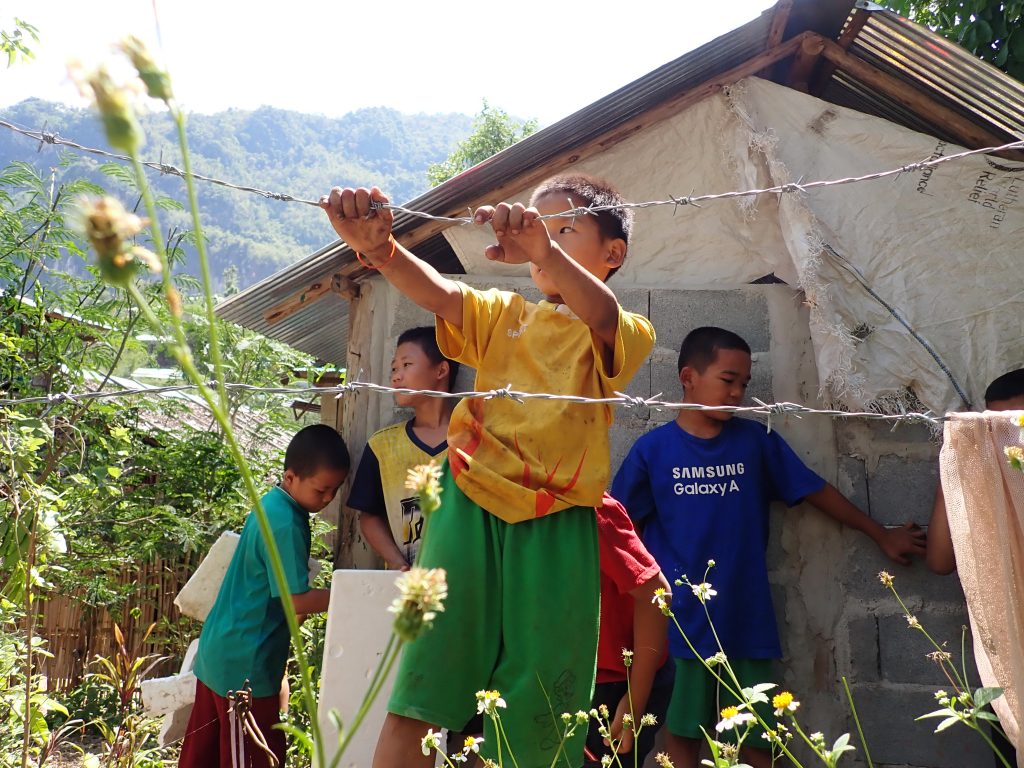
Three generations of children were born in Mae La Camp and have never seen the outside world / Visual Rebellion Myanmar
Refugees from Myanmar face continued hostility from the Thai government. This hostility is rooted in Thai law. In 1951, Thailand chose to not participate in the U.N. Refugee Convention that outlined the obligations countries have to refugees nor did they participate in a follow-up convention in 1967. A crucial part of the 1951 convention is the non-refoulement principle that requires countries to not return asylum seekers to their native countries if they would experience persecution. Furthermore, the Immigration Act of 1979, provides immigration officials nearly unlimited power when handling non-citizens in Thailand. This puts many Myanmar migrants in positions in which they are forced to cross the border back to Myanmar, a dangerous act that leads many to face death risks. Despite the affirmation to respect the non-refoulement principle and provide sufficient humanitarian assistance to over thousands of people sheltering along the Myanmar-Thailand borderlines, the Thai government has experienced heavy criticism for continuously forcing returns.
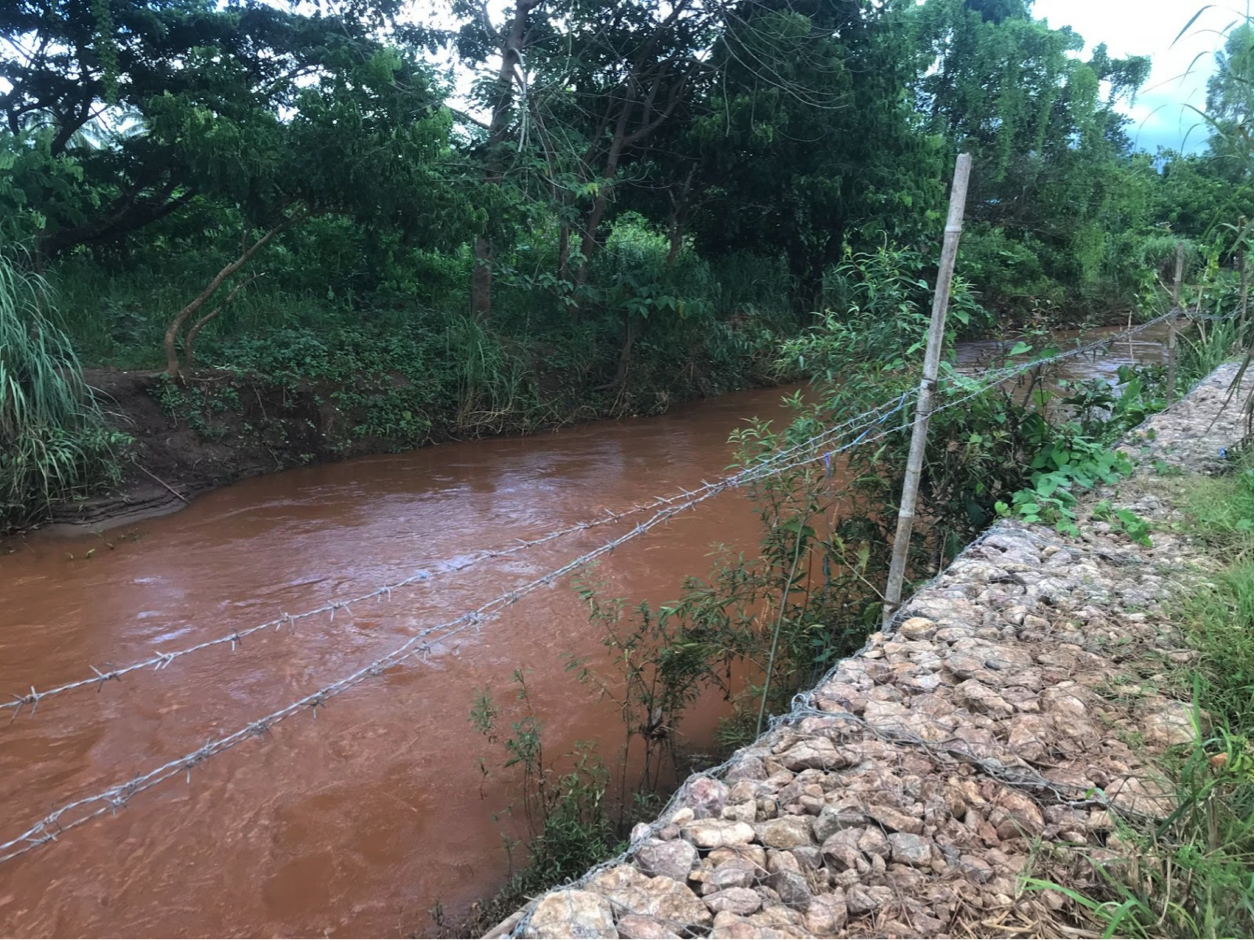
In some parts of the Moei river, the natural border between Myanmar and Thailand is very narrow / Visual Rebellion Myanmar
On October 7th, Daw Thing Gi Soe tried to swim across the Moei river, the natural borderline between Myanmar and Thailand to escape from the Thai police. She drowned, leaving her four year old son without a mother. Also, she left many patients she had cared for according to the CDM Medical Network. Due to her participation in the Civil Disobedience Movement (CDM), she was pursued by the SAC and had to flee from the hospital she was working in. This led her to hide near the border. In her final moments, she was chased by the Thai police during her trip to the market in Mae Thanh, Tha Song Yang district, Tak province. This led her to attempt to swim back to the Myanmar side of the river.
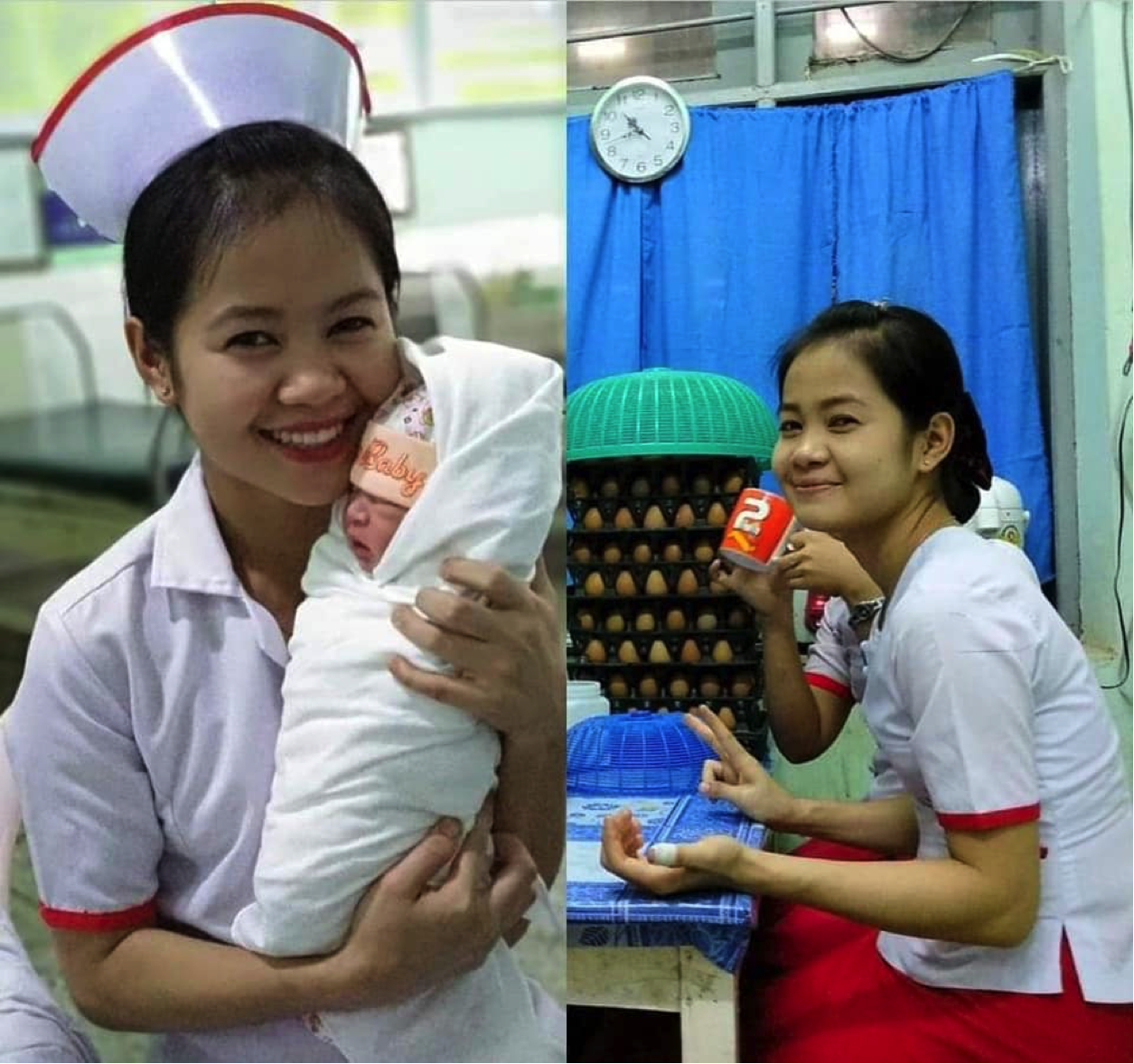
A similar tragedy happened only a week before. Over a hundred students sheltering on the Thai side of the border, were forced to return to Myanmar by crossing the flooded Moei river in the pouring rain. A video showed the boat carrying the students colliding with another boat and nearly sinking. The students died fleeing the conflict between the Karen National Union’s (KNU) Brigade 6 and State Administration Council (SAC) forces.
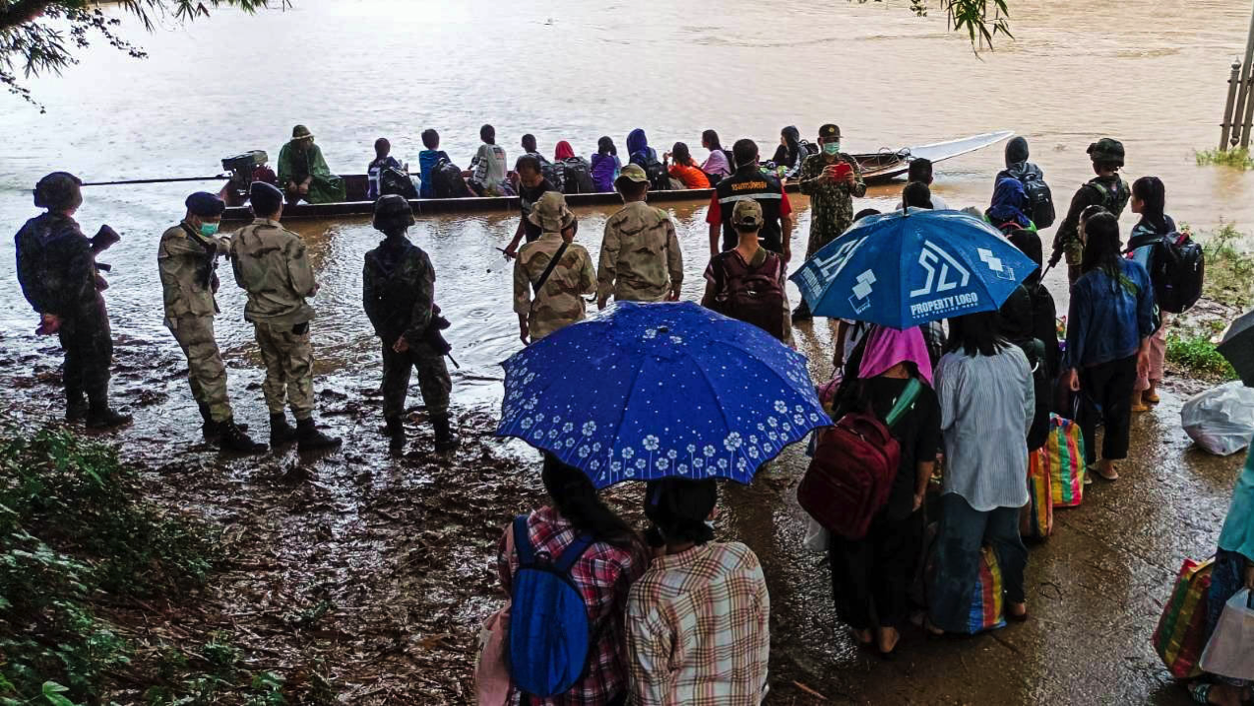
A group of students sheltering on the Thai-Burma border were forced to cross the flooded Moei river when returning to Myanmar. // Karen Human Rights Group
There has been a big surge of Burmese people seeking temporary refuge in neighboring countries, especially Thailand since the political crackdown in 2021. UNHCR estimates that more than 70,000 refugees have fled from Myanmar to neighbouring countries since the coup. People seeking refuge are from every background and include white-collars and blue-collars workers, students and families, CDM and PDF (People’s Defence Force) members. Political and economical challenges drives pushed people into a vulnerable situation when they arrive in Thailand as they have to take informal jobs with no social protection and are at risk of being arrested at any time. In addition, thousands of people living along the border sought a few days of shelter from airstrikes by moving on the banks of the river.
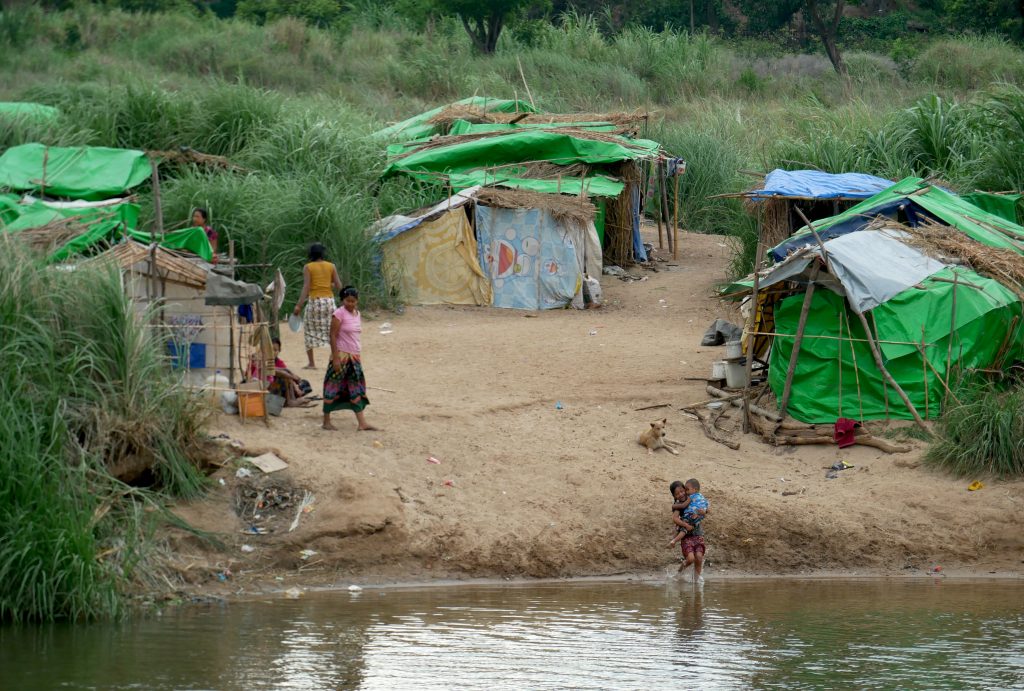
“The Royal Thai government should look at its own role in helping to create refugees rather than forcing them back into danger,” condemned The European Karen Network in a statement. On October 25, 2022, the Thai government published the Prevention and Suppression of Torture and Enforced Disappearance Act B.E.2565 (2022) (the Anti-Torture Act) in the Royal Gazette. This new law includes a provision codifying the principle of non-refoulement, which prohibits the forced return of a person to a country where they may face torture or other forms of ill-treatment.
“This new law will make it illegal for Thai officials to push refugees back to Myanmar, where the junta is systematically torturing people,” said Amy Smith, Executive Director of Fortify Rights. “Thai authorities should urgently identify and provide legal recognition to Myanmar refugees to prevent forced returns.”. Thailand has recently announced its candidacy for the UN Human Rights Council (HRC) membership for the 2025-2027 term. Human rights groups have called upon the country to legally recognise the refugees’ status.
➽ Please read our team story on the situation of migrant workers in Mae Sot since Covid / Coup.
It was published in Burmese in Oway, the legendary magazine chronicling the student and anti-military movements in Myanmar for decades (Pages 23-31).
➽ Visit the Borderline Collective, that runs “a photo-exhibition by migrant workers about their living conditions around Phopphra while they grow our food” in Mae Sot from 12-26 November 2022.
